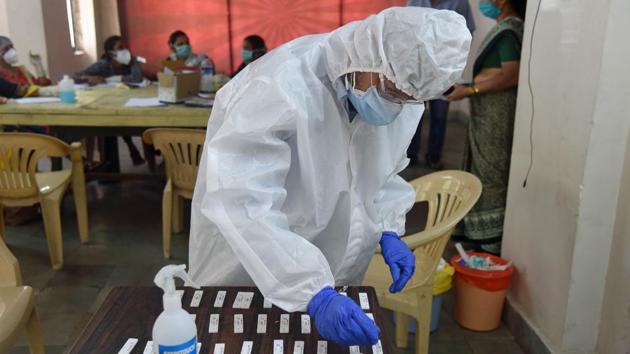WHO spotlights safety of health workers amid Covid-19, releases charter
The physical risks faced by health workers are compounded by psychological stress from working in high-risk settings for long hours, constant fear of infection, separation from family, and social stigmatisation.
A day after the Centre said it had no national database on the number of health workers who had died of coronavirus disease (Covid-19), the World Health Organization on Thursday released a Health Worker Safety Charter that calls on governments to address persistent threats to the health and safety of healthcare staff and their families who are facing disproportionately high risk of infection and death.

Health worker safety is critical to ensure continued availability, access and delivery to health services. While health workers represent less than 3% of the population in the large majority of countries and less than 2% in almost all low and middle-income countries, around 14% of Covid-19 cases reported to WHO are among health workers.
“No country, hospital or clinic can keep its patients safe unless it keeps its health workers safe.… Every day, health workers are exposed to stress, burnout, stigma, discrimination and even violence. Now more than ever, we have a duty to give health workers the safe working conditions, the training, the pay and the respect they deserve,” said Dr Tedros A Ghebreyesus, WHO Director-General, at the launch of the charter.
At least 136 million people are employed in the health and social services sector globally, according to the WHO.
“Some of the factors that are contributing to an alarming number of infections among health workers are the lack of personal protective equipment (PPE) or the proper training to use it. WHO has been supporting countries to address this issue by providing PPE to countries along with masks and face shields, gowns, gloves and goggles; and training health workers on their use and infection prevention and control,” said Dr Poonam Khetrapal Singh, Regional Director, WHO South-East Asia Region, of which India is a part.
Data from India is woefully inadequate. Since health is a state subject, the Union health ministry does not have national data on Covid-19 infections and deaths among health workers, according to the ministry of health and family welfare statement in Parliament on September 15. The Centre only has records of the deaths of only 155 health workers whose families had sought relief under the Prime Minister Garib Kalyan Package that offers an insurance cover of Rs 50 lakh for loss of life or accidental death for people on Covid-19-related duty.
In India, 64 doctors, 32 nurses, 14 Asha (community health workers) and 45 support staff, such as ambulance drivers, ward boys, cleaners, and cremation staff have sought the insurance cover, according to the government statement.
This is a fraction of the deaths attributed to Covid-19 by Indian Medical Association (IMA), which said 382 doctors have died, with the youngest being 27 and the oldest, 85 years old. “If we can have national data for Covid-19 cases and deaths, why can’t we have national data for cases and deaths among doctors and other health workers? Blaming the lack of nationwide data on health being a state subject is inexcusable. Like soldiers, health workers fight in the frontlines, but unlike soldiers, we also risk taking the infection home to our homes,” said Dr Ranjan Sharma, national president, IMA.
The physical risks are accompanied with psychological stress from working in high-risk settings for long hours, constant fear of infection, separation from family, and social stigmatisation.
Two in five healthcare professionals on Covid-19 duty have trouble sleeping, and one in five report depression and anxiety, with the rates of depression and anxiety being higher in female health workers and nursing staff than men, found an analysis of data from 13 studies of 33,062 frontline workers during the Covid-19 pandemic. The study was published in the journal,Brain, Behaviour and Immunityin August.
“Reducing the workload and stress on health workers is imperative. Healthcare workers are in need of psychosocial support in these trying circumstances. Communities can play their part by adopting behaviours that reduce disease spread so that healthcare systems, and as result health workers, are not burdened. We all have a role to play,” said Dr Khetrapal Singh.
The charter also calls for ensuring adequate rest breaks, safe staffing levels, and fair duration of working hours for optimal physical and mental health.
Among the other key recommendations of WHO’s Health Worker Safety charter are establishing synergies between health worker and patient safety strategies through infection prevention and control programmes, and reporting, licensing and accreditation standards; ensuring occupational health and safety; and zero tolerance to violence among health workers.
Get Current Updates on India News, Lok Sabha Election 2024 live, Infosys Q4 Results Live, Elections 2024, Election 2024 Date along with Latest News and Top Headlines from India and around the world.




